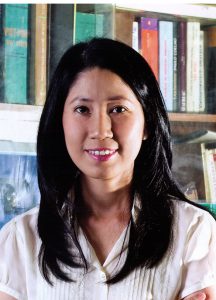
A. Prof. Dr. Vuong Thi Ngoc Lan obtained her MD from the University of Medicine Pham Ngoc Thach (1996), a Master in Clinical Embryology from the National University of Singapore (1999), a specialist qualification (2003) and PhD in Obstetrics and Gynecology (2016) from the University of Medicine and Pharmacy at Ho Chi Minh City, Vietnam. She has been nominated as Associate Professor since 2019. She is currently the Head of the Obstetrics and Gynaecology Department and the Vice Dean of Faculty of Medicine, University of Medicine and Pharmacy at Ho Chi Minh City. Dr. Lan has authored more than 30 publications in high-ranking international scientific journals. Her works have been frequently cited by other scientists in the Reproductive Medicine field (~ 600 citations and H-Index of 12 according to Google Scholar dated May 2020). Dr. Lan maintains strong engagement with community groups and is recognized as a local expert in her field. She has served as an associate editor and a peer reviewer for local and international scientific journals.
Currently, Dr. Lan and her team are establishing a research group in Reproductive Medicine with the goal to become one of the leaders in the Asian scientific research community. In 2019, Dr. Lan and her team published eleven (11) articles and up to May this year, her group has published six (6) articles in the ISI journals.
Work
Lan N. Vuong, Vinh Q. Dang, Tuong M. Ho, Bao G. Huynh, Duc T. Ha, Toan D. Pham, Linh K. Nguyen, Robert J. Norman and Ben W. Mol, 2018. IVF transfer of Fresh or Frozen embryos in women without Polycystic Ovaries. The New England Journal of Medicine, 378(2): 137-147.
In vitro fertilization (IVF) is one of the medical breakthroughs of the 20th century and the inventor was awarded the Nobel prize in 2010. Traditionally, IVF has been performed with the transfer of several fresh embryos. “Spare” embryos from a fresh transfer cycle were frozen for later transfer should the fresh cycle not result in successful pregnancy. Because there has been lack of confidence in results from freezing, more than one fresh embryo has been usually transferred. Demonstration that frozen embryos produce the same pregnancy rate with less complications would transform the way IVF is practiced.
We performed a large randomised clinical trial (RCT) comparing pregnancy and birth outcomes in cycles where all embryos were frozen with subsequent transfer or a cycle where fresh embryos were transferred. Our study in 782 infertile Vietnamese women without polycystic ovary syndrome showed that ongoing pregnancy and live birth rates were comparable after freezing the embryos. These robust findings were published in the premier medical journal New England Journal of Medicine. They informed couples value of each treatment protocol and allowed couples and their doctors to choose the best way of transferring embryos after IVF, while opening the way to transfer of a single embryo, one at a time, thus reducing the complications of multiple pregnancies.